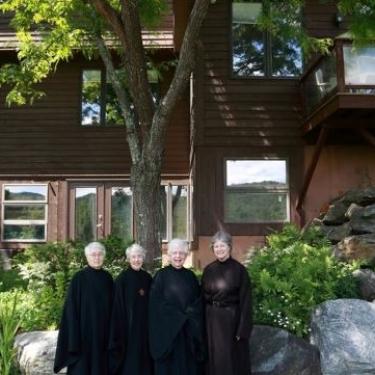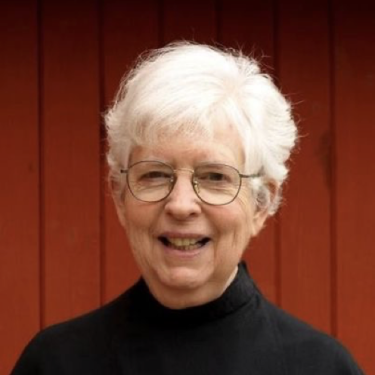
Sister Rebecca Cown is our Woman of the Week, nominated for her work in spiritual direction. You see her here with other members of the New Skete communities:
"Since 1987 I have been a professed member of the Nuns of New Skete, a monastic community dedicated to Our Lady of the Sign. I have lived over forty years in monastic life. It is from this and prior background and perspective that I will be sharing from my own spiritual direction experience. My personal journey has taken me over a number of countries: born American, Roman Catholic, military background, and lived within the four corners of the USA and abroad, Guam, Quebec, Hong Kong, Switzerland, and France. My first personal experience of spiritual direction was during my 10 years in Hong Kong. I profited immensely from a retired French Bishop of Mongolia--a true wise and holy man whose spiritual teaching and pastoral care have made an impact on me to this day. The 2nd most important spiritual guide (a true spiritual mother) was the Foundress and Prioress of a monastery in So. France. I was a member of this monastic community for 12 years. It is steeped in the Liturgical and Spiritual life of the Eastern Orthodox Church. From its very beginnings it struck roots in the early Desert Tradition with special focus on the spiritual guidance letters of the Startzi (Elders) of Gaza, Barsanuphius and John, to their disciples. After about 5 years of spiritual guidance and monastic practice, she asked me to participate in the spiritual formation of the novices and later with retreatants. (The term spiritual direction was not used but the reality of accompanying people on their spiritual journey was the same.) I remained accountable to her of my own personal journey as well as in my spiritual accompanying of others. These two masters of the spiritual life, from whom I not only benefitted from spiritual guidance, I also received invaluable teaching.
"It is always difficult to express in words what I received from these two spiritual guides. Tentatively I would say the importance of self-knowledge and discernment. It is an extraordinary gift to find elders who are competent and willing to listen to disclosure of thoughts (logismoi). To be able to lay before my elders my thoughts, feelings and at times, through painful crises, has been a healing, enlightening process and one of gradual freedom on the road to becoming conscious of who I really am. But most of all to experience a deepening awareness of the Presence of God as loving and compassionate not only despite my sense of unworthiness but because of it. This journey, by the way, is never over as long as we are in this earthly existence.
"Several years after I began my journey as a Nun of New Skete I was asked to accompany people-in and out of the community of New Skete. But around the year 2002, I was encouraged to start a Spiritual Direction course in order to be certified in the practice. After several sessions my mentor said that view my previous experience I could be certified immediately and start receiving directees. Since I was guest sister a I received a number of requests and have been serving in this capacity ever since."
Axia!
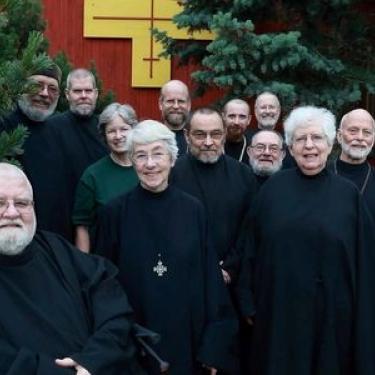
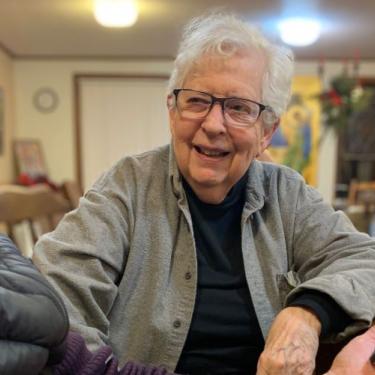
Our Woman of the Week is Sister Rebecca Cown, nominated for her work in spiritual direction. You see her speaking at St. Phoebe Center for the Deaconess conference, and at the monastery with women who were attending one of her retreats. We asked her to walk you through what spiritual direction is, and what you might look for in a spiritual director:
"Our monastery frequently receives people who are seriously questioning, What am I? What is my purpose in life? Why am I here? When I listen to them I often sense an awakening to the Mystery of God within themselves, a thirst for God. In The Orthodox Way, Metropolitan Kalistos Ware comments on this opening to a sense of the Holy One, a sense of transcendence when he writes, 'The boundaries of the human person are extremely wide; each of us knows very little about his/her true deep self. Through our faculties of perception, outward and inward, through our memory and through the power of the unconscious, we range widely over space, we stretch backward and forward in time, and we reach out beyond space and time into eternity. “Within the heart are unfathomable depths," affirms The Homilies of St. Macarius. "It is but a small vessel: yet dragons and lions are there, and there poisonous creatures and all the treasures of wickedness; rough uneven paths are there, and gaping chasms. There likewise is God, there are the angels, there life and the Kingdom, there light and the Apostles, the heavenly cities and the treasures of grace: all things are there."’
"Unless there is an initial awakening it is unlikely that anyone would desire spiritual direction. For some it is the beginning of a transforming power in one’s life. In our Orthodox tradition we call ‘awakenings to the perception of God within’, an invitation to what we long for most in life: communion with God or Theosis or Deification. However, except for very few individuals, even after this initial awakening to grace we still experience ourselves caught up in controlling relationships, unearthing of inner traumas, imposing our personal agendas, affirming our egos and in general fixating our minds on the surface of life often unaware of the subtle currents of the Spirit within. It is this experience that drives certain people to seek out a spiritual guide.
"What is Spiritual Direction? Spiritual direction is nothing more than a path leading us to perceive and obey the Holy Spirit in the depth of our being. Or more simply, as one of my own spiritual teachers said, 'My job as spiritual guide is to keep my students from tripping over the rocks in the road.' As a student, my teacher keeps me from tripping over the rocks in the road. Of course there is much more to it than this. But it does express the process in a nutshell. My teachers help me to stay on the path. I pass it on. ‘Pass on’ could be the motto of all spiritual guides.
"We are called to become rooted in contemplative awareness. We need to embrace the appropriate spiritual tools to free ourselves from whatever holds us captive in order to allow ourselves to grow in consciousness of our true nature. And in this process we learn to allow others, and things be who and what they are in their uniqueness. This process is a lifelong one of awakening and metanoia (change of heart) in every area of our lives.
"There appears to be a ‘lock in’ regarding terminology: director/directee. Our Eastern Orthodox tradition has coined the terms Spiritual Mother, Spiritual Father or a generic Spiritual Elder. I often hear the term spiritual accompaniment and there are a number of other terms, but the one most frequent seems to be spiritual director. For the sake of brevity, I will continue to use the terms "director/directee" all the while knowing that the only Director is the Spirit of God. The director, a lower case ‘d’, is one who accompanies the other on the spiritual path, assisting them at times to articulate their experiences, their thoughts (logismoi) and to bring to light how God may be calling them to greater Life.
"Do we really need a spiritual director? For those who wish to walk the spiritual path, I think yes. To quote Metropolitan Kallistos Ware again, from a piece he wrote in Cross Currents, called 'The Spiritual Father in the Orthodox Church,' 'One who climbs a mountain for the first time needs to follow a known route, and he needs with him as companion and guide, someone who has been up before and is familiar with the way.'.
"Over the years I have encountered people who want the spiritual director to tell them what to do. They do not want to take responsibility for their own lives. It is easier to follow someone else’s path than to do the hard work of forming one’s conscience, to pray, take on the tools for spiritual growth especially that of discernment. A spiritual director is not a law giver. Nor is the spiritual director out to get disciples. He/she points and leads to the person of Christ Jesus--the paschal mystery, his life, example and teaching. It is also about how I live my life of faith and being held accountable.
"Who may become a spiritual director? Obviously, a spiritual director must be one who has already been on the spiritual path with a guide. There needs to be a modicum of silence and solitude in one’s life and a very deep prayer life. Few if any are going to flee to the desert for deepening their relationship to God as our forebear did. The real journey is within the heart. It goes without saying that one who accompanies another needs to be in spiritual direction oneself. In addition there needs to be accountability to another spiritual director or a peer supervision group.
"Spiritual direction is a process that is mutually beneficial. The director too gains spiritually.
“As Metropolitan Kallistos writes, 'Through instructing others we ourselves perhaps begin to learn. Slowly we recognize our powerlessness to heal the wound of humanity solely through self-help programs and psychoanalysis. Our self-dependence is broken down, we appreciate our own inadequacy…Through our anguish over the pain of others, we are brought to deepen our own journey inwards and seek the Kingdom of Heaven within-to enter into the secret chamber of the heart where alone a genuine solution to the world’s problems can be found. Circumstances may not allow us to seek out desert solitude as felt needed but what is supremely important is that each should seek to be a hermit of the heart.'
"Traps and abuses: The recourse to a geronda (elder) can sometimes run afoul when human weakness can infect the relationship with the need to control or when the spiritual guide is fascinated with power. Presently we are hearing about a good deal of pastoral abuse. Let’s face it: there are false guides out there. The person seeking spiritual direction must also learn to discern and follow one’s conscience. Paul Evdokimov writes: 'A spiritual father is never a director of conscience. Both director and directee place themselves in the school of truth. There is no room for idolatry even be he/she a saint."
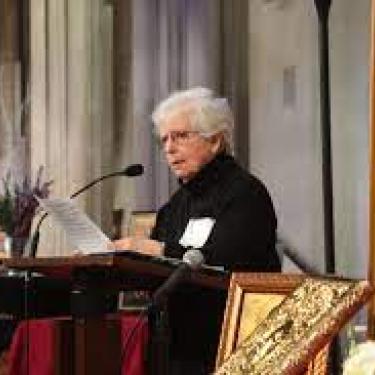
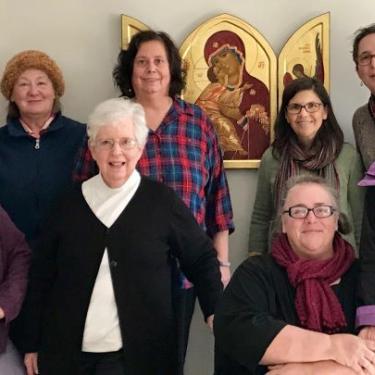
"The call to the ministry of Spiritual Direction: I would like to refer again to Metropolitan Kallistos' article from The Spiritual Guide: ‘The elder…is essentially a "charismatic".. accredited for his or her task by.. the Holy Spirit. Spiritual guides are ordained not by human hands but by the hand of God. They are an expression of the Church as "event" or "happening" rather than of the Church as institution.' He goes on to say that the Sacrament of confession is certainly an appropriate occasion for spiritual direction, yet spiritual eldership may also be exercised by a simple monk, a nun or lay person, woman or man. “'If, however, spiritual mothers or fathers are not appointed by an official act of the hierarchy, how then do they come to embark on their ministry?' …Fr. Alexander Elchaninov says, they are "recognized as such by the people.”' Within the continuing life of the Christian community, it becomes plain to the believing people of God--which is the true guardian of the Holy Tradition—that this or that person has the gift of spiritual eldership. Then in a free and informal fashion, others begin to come to her or him for advice and direction.
"As a rule, it is the disciple who takes the initiative to ask for spiritual guidance. It would be presumptuous for anyone to advertise oneself as a spiritual guide.
"A question comes up: Since spiritual direction is now pretty much the ‘in thing’ here in America and across the religious spectrum, should spiritual direction be taught in our colleges or seminaries? What about getting a degree in spiritual direction? In an Ancient Faith interview, Fr. Steven Tsichlis said this is a huge issue. On the other hand he also said that we can certainly have classes on this topic whereby we familiarize ourselves with the writings on this subject beginning with St Antony the Great and dozens of contemporary articles that have been written. However, it must be understood that studying about spiritual direction, even getting a degree, does not make one a spiritual director. That part is a gift of God.
"Anyone engaged in the pastoral ministries, whether confessor or spiritual guide must be on the spiritual path themselves. This means being not only familiar with the ascetic writings, the primary sources, for example, John Cassian’s Conferences and the Institutes, but actually applying the teaching into our own practice. It means doing the inner work on one’s own passions-greed, lust, anger, vanity, pride etc. We need to grow in our self-awareness and self-knowledge. And last but not least we must be persons of prayer, contemplation, communion with God and a regular liturgical life and sacramental life.
"Spiritual direction and Counselling: In my experience I have sometimes felt the need to strongly suggest to one or other directee to see a counselor. Spiritual direction does deal with the same raw material, so to speak, as with therapy but the aim and the method is very different. At times the ideal would be for the director to be trained and competent in both areas.
"There is a growing awareness and need for some persons needing both processes, i.e., the convergence of spiritual guidance with counseling. Years ago I was fortunate to have such a person trained in both fields. Presently though, I believe it rare to find a gifted spiritual director having the psychological training as well."
As always, we asked our Woman of the Week, Sister Rebecca, about her morning routine. You see her here with her fellow nuns at New Skete:
"As the third topic in this series I have been asked, 'How do I spend my morning?'
"It is really very simple. Way before dawn: time is devoted to personal prayer such as Lectio Divina, contemplation, meditation, spiritual reading and journaling. Community worship follows and ends with shared Gospel. My morning workday is varied: spiritual direction, preparation for retreats, composing liturgical reflections, classes, meetings, or engaging in community needs of all sorts such as car maintenance, cooking and other needs of the day.
"There is nothing really complicated about writing on this topic, but my hesitation and procrastination are more about something in me—call it an 'allergy' to possible comparisons. That is, in my experience people seem to admire monks and nuns as being superior in God's eyes, in part because we spend so much time in spiritual endeavors, in contrast to what they see as hardly good enough in their own Christian way of life. They may go so far as to blame themselves for not praying and doing spiritual reading more than they do.
"This brings to mind Saint Anthony the Great, our forebear Father of the earliest monastic Skete of the desert monastic tradition, which we here at New Skete strive to follow in our contemporary world. As you may recall from reading the sayings of the Desert Fathers and Mothers, Saint Anthony at one point heard a voice within, telling him that there was an athlete of prayer and ascetic practice still greater than himself. Anthony was then led to a village on the outskirts of Alexandria, where he found the poor dwelling of a cobbler. In speaking with this man, Anthony learned that he worked all day making and mending footwear to support his family with his meager earnings. All the while doing this, he would pray not only for his customers but for all the passersby he saw through his window. Another version of this account states that the cobbler arose every hour and bowed as he prayed the Trisagion three times. He praised God and sought God's mercy for himself and for others. Anthony left the cobber highly edified and enlightened.
"God looks at the heart, and one can find God's presence in all that one does, whether of a spiritual or a physical nature. Seeking God's face in the daily is what pleases God most, along with love, compassion, and service to others.
"Yes, we as monastics are called to a life where there is ample time for personal prayer and worship, which of course includes manual labor and service. And like the cobbler and a multitude of others, we live the vocation we are called to by God. This life is not a separation. Nor is there a value judgment of any kind of work, whether 'blue collar' or 'white collar,' but we work in communion of mind and heart with all laborers in the vineyard of the Lord."
Thank you, Sister Rebecca!
